Bien Hoa Airbase
http://www.vhpamuseum.org
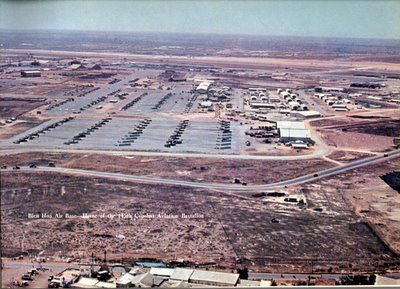
When the door of the plane was opened, we disembarked and began walking down the stairs to the tarmac. We went from the comfortable air-conditioned plane into the very hot, muggy, oppressive heat and became instantly drenched in sweat. The air was thick with so many new smells and sounds. There were the never-ending sounds of jets and choppers taking off and landing and the trucks and jeeps that were always on the move. There were so many new smells permeating the air but the one I remember most, the one smell that these some 37 years later instantly brings me back to that time, was the smell of diesel fuel. To this day, whenever I catch a whiff of diesel, I am instantly taken back to that time and transformed into that young soldier again.
http://www.gingerb.com
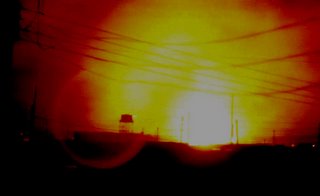
We were walking toward a building still in awe of what was all around us, when all of a sudden we heard an explosion, then another. Someone started yelling, “Get inside, get inside! Double time, double time!" We were rushed inside the building to a holding area. “OMG! What the fuck is happening?” I said to no one in particular as I ran for the building. Once inside, I saw a lot of people just going about their business like nothing was happening. No one was panicking, its as if no one even knew what was going on outside.
“Okay, calm down!” someone in green jungle fatigues yells out. “It’s over now, so calm down!” Sure enough, it was over, it ended as quickly as it began. The man in the fatigues explained that the airport had been under attack by rockets, that these kinds of attacks happened almost everyday, sometimes more than once. “You’ll get used to it,” he said. "Yeah, right", I thought, "I’ll never get used to that." Little did I know that really I would get used to it just like he said we would.
Off to one side in this holding area was a group of men that were waiting to catch the plane we just got off. They made through the year and now where going home. I remember thinking, would I make it back here in a year to catch that flight back? No time to think, time for another bus ride.
90th Replacement Center at Long Binh
http://saito56.blogster.com/
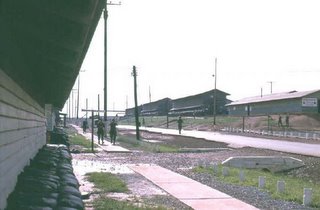 They took us outside where we boarded some more buses. These had screens over all the windows just in case someone tried to throw a hand grenade or something like that through one of them. The bus took us to the 90th Replacement Center in Long Binh where we went through in processing that lasted most of the night. We were assigned a bunk to catch a little sleep and were up early to eat breakfast and then stand in formation. Formation was held a couple of times a day to assign us to our units. I was assigned to the 25th Infantry Division at Cu Chi.
They took us outside where we boarded some more buses. These had screens over all the windows just in case someone tried to throw a hand grenade or something like that through one of them. The bus took us to the 90th Replacement Center in Long Binh where we went through in processing that lasted most of the night. We were assigned a bunk to catch a little sleep and were up early to eat breakfast and then stand in formation. Formation was held a couple of times a day to assign us to our units. I was assigned to the 25th Infantry Division at Cu Chi.
When my name was called, I was put on a C-130 cargo plane for the flight to the base camp in Cu Chi. It was like a small city. It had every type of facility there was in small cities; swimming pools, bars, slot machines in the bars, a hospital, stores and even saunas. I remember thinking why in the world would they have saunas in such a hot, muggy place? "(massages,hee hee!)
25th Division Base Camp at Cu Chi
 I spent a week in Cu Chi going through in-processing and for some specialized training. This training was to teach us the things we needed to know that were not taught in basic training and AIT, like standing "real" guard duty and crawling through a tunnel. After that week at Cu Chi, I was assigned to the 2nd platoon, Bravo Company, 2nd Battalion, 12 Infantry, 25th Infantry Division; B 2/12 as they called it. A group of us got on a supply chopper for the flight to Fire Support Base Pershing, eight miles northwest of Cu Chi in the middle of some rice paddies somewhere.
I spent a week in Cu Chi going through in-processing and for some specialized training. This training was to teach us the things we needed to know that were not taught in basic training and AIT, like standing "real" guard duty and crawling through a tunnel. After that week at Cu Chi, I was assigned to the 2nd platoon, Bravo Company, 2nd Battalion, 12 Infantry, 25th Infantry Division; B 2/12 as they called it. A group of us got on a supply chopper for the flight to Fire Support Base Pershing, eight miles northwest of Cu Chi in the middle of some rice paddies somewhere.FSB Pershing was a battalion size base camp with four companies of infantry and an artillery and mortar battery. I wasn't at Pershing very long, about a week or so, so I didn't see very much of it. Here are a few pictures I found on the internet at http://www.212veterans.org.
Landing Zone Outside FSB Pershing
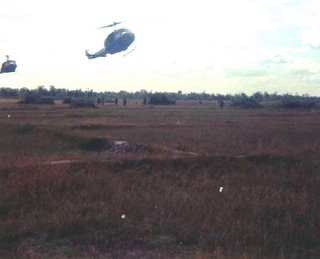
View of FSB Pershing
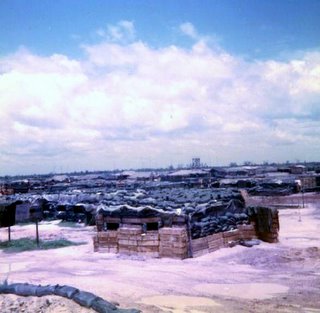
105mm Howitzer
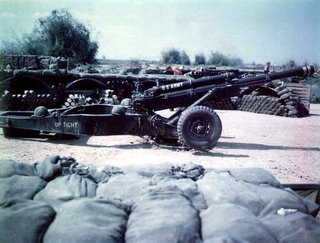
4 1/2 Inch Mortar
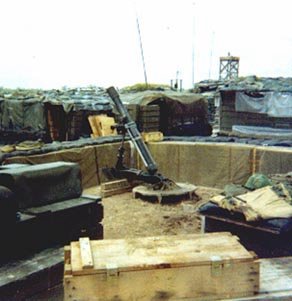
Mess Tent
http://www.gingerb.com
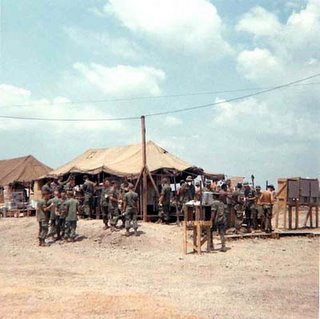
 Just before dark that first night, I was sent over to man a bunker, pretty much like the one in the this picture. As you can see, bunkers are really nothing more that a pile of sandbags with a small doorway and a few small holes to look out of. The bunker I was sent to, was usually manned by a few guys in another platoon, but they were sent out on a night ambush patrol that night. There was no one else in it at the time. I was told someone else would be over in a little while and we were to take turns keeping watch that night. That's how every night was, you take turns sleeping and stand watch.
Just before dark that first night, I was sent over to man a bunker, pretty much like the one in the this picture. As you can see, bunkers are really nothing more that a pile of sandbags with a small doorway and a few small holes to look out of. The bunker I was sent to, was usually manned by a few guys in another platoon, but they were sent out on a night ambush patrol that night. There was no one else in it at the time. I was told someone else would be over in a little while and we were to take turns keeping watch that night. That's how every night was, you take turns sleeping and stand watch.Now picture this, here I am on my first night out in the field, about a million miles from home, in only God knows where, inside a pile of sandbags in total darkness, staring out through a small hole in the front of this pile of sandbags. Since this my first night out in the field, I had no idea what to expect. I was truly scared to death.
Not long goes by and there was a loud explosion somewhere behind my bunker. Next thing I know, flares are going off in the sky lighting the entire area of the perimeter up to the woods.
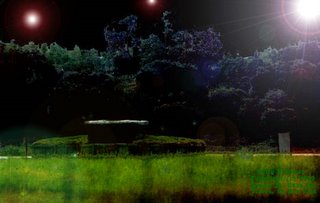 I scan the horizon searching for the enemy but didn't see any. Then there's another explosion; I’m practically shitting in my pants about now. Just then, someone dashes inside the bunker. Thank God, I’m not alone anymore. I look over quickly at the guy, but don’t see him carrying a weapon.
I scan the horizon searching for the enemy but didn't see any. Then there's another explosion; I’m practically shitting in my pants about now. Just then, someone dashes inside the bunker. Thank God, I’m not alone anymore. I look over quickly at the guy, but don’t see him carrying a weapon."Where’s your weapon?”
“I don’t carry one, I’m a medic.”
Oh, that’s great, this guy has no weapon. But then I thought, “Oh well, if I get wounded at least there’s a medic close by."
I look back outside through that little hole in the front of the bunker and Doc looks out of the second little hole. We keep our eyes glued to those little the holes. It all stopped after about 4 or 5 explosions.
It wasn’t very long before I heard a helicopter land in the landing zone in the picture above. I was to find out the next day, that the chopper was a medivac and the explosions I heard were from a rocket attack. Someone came by a few minutes later to see if we were alright. He also brought a radio and told us that about every half-hour, someone would call our position and we were to respond with “Sitrap negative”, meaning no trouble, or “Sitrap positive” if there was any. Then he leaves us. The enemy never did attack that night, and the rest of the night it was quiet.
While I was at Pershing that short time, these kinds of attacks happened pretty much every night, but with mortars that never even hit inside the base camp. The enemy would guess the range from somewhere beyond the tree line and fire a few shells in our general direction, always landing out in the rice paddies somewhere. After a few days, I got used to them like the guy in fatigues at Bien Hoa said we would and just learned to accept them as a fact of life over there.
No comments:
Post a Comment